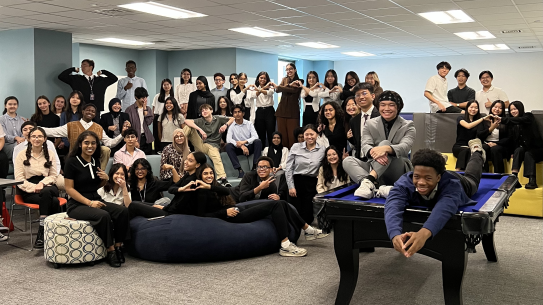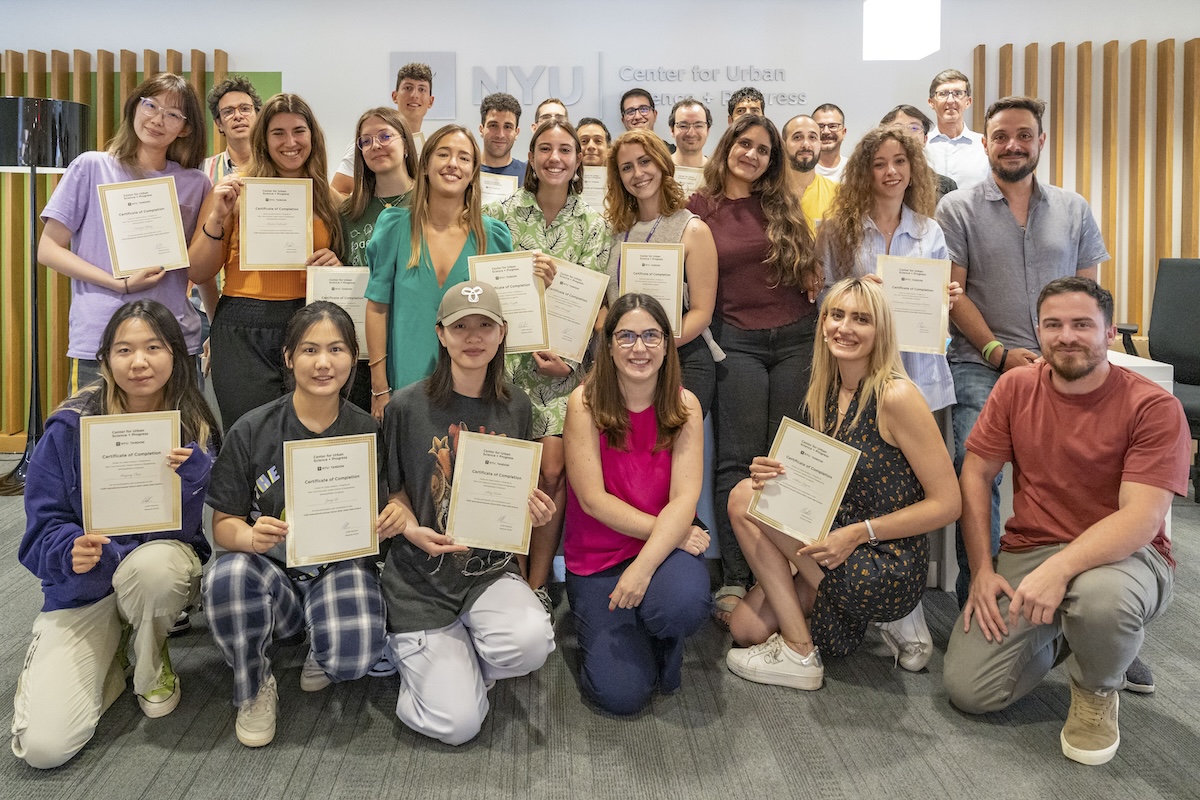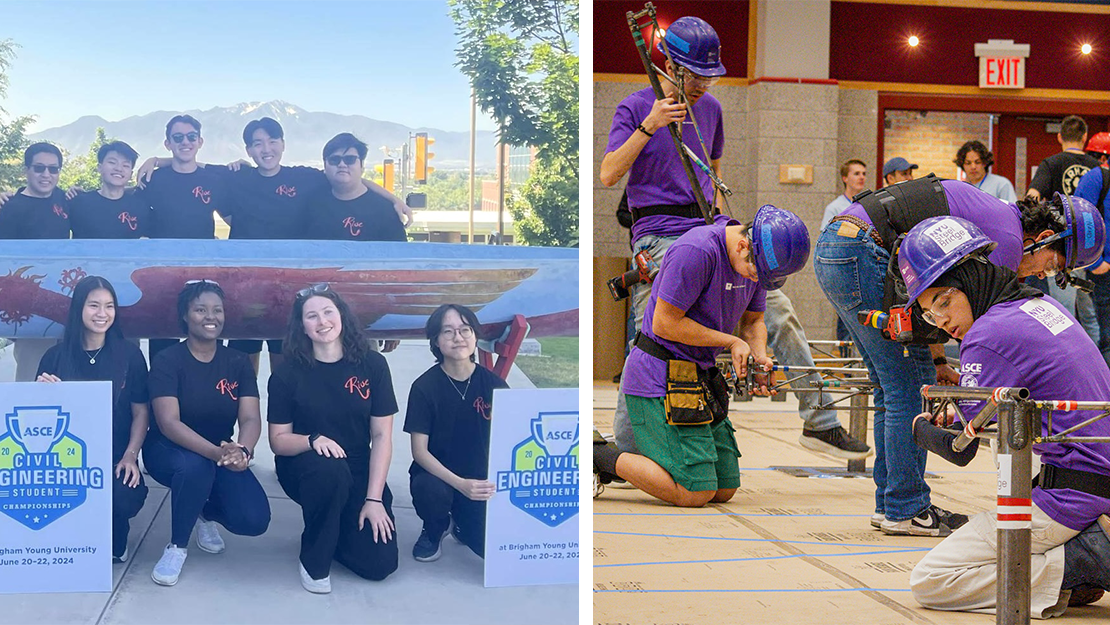Making a Modern Curriculum

At NYU Tandon, students are encouraged to think of how they will eventually use the knowledge they acquire to solve real-world problems and forge a solid career path.
That means incorporating more hands-on, experiential learning opportunities, such as Vertically Integrated Projects stressing sustainable practices, along with ethics and responsibility; and encouraging multidisciplinary teamwork — all elements that will allow students to thrive after they graduate.

And sometimes it means making shifts — spearheading new courses, responding to industry needs, and ensuring that students become as well-rounded as possible. To that end, in recent years, Tandon has made several innovative enhancements to its offerings, hired exciting new faculty members, and launched new degree programs such as the urban science doctoral track — run under the auspices of Tandon’s Center for Urban Science + Progress (CUSP) and aimed at Ph.D. students from departments across the school who want to approach research in their own fields through an urban-science lens that encompasses sensing, complexity, and informatics — and the flexible, fully-online, “build your own” Master of Science in Emerging Technologies, which allows students to craft their own curriculums to match their professional goals.
The innovation starts well before the graduate level though. Incoming Assistant Professor of Mechanical and Aerospace Engineering Augustin Guibaud is excited to be teaching in the Department of Mechanical and Aerospace Engineering under the direction of Chair Katsuo Kurabayashi. In the offing is a new undergraduate course. “We’re planning to teach things like heat transfer, propulsion, and friction using toy models called pop-pop boats, so I think that will probably be very popular with students,” Guibaud has predicted.
A new field demands quantum curricular leaps
In the past decade, quantum technology — the use of quantum mechanics to create new devices and applications — has demonstrated remarkable promise with its ability to significantly enhance computing power, enable secure communication, and advance precision measurement.
The demand for people with quantum training and expertise far exceeds availability, however, with research showing only one qualified quantum candidate available for every three quantum job openings.

Tandon recently became one of an extremely select group of American universities offering an undergraduate program in quantum technology, situating it at the forefront of the fast-growing field.
John Di Bartolo, chair of NYU Tandon’s Applied Physics Department, worked with NYU colleagues and professionals from the educational outreach program at SandboxAQ — an enterprise SaaS company providing solutions at the nexus of AI and Quantum technology (AQ) — to create a minor that requires the completion of six courses: Introduction to Quantum Science, Introduction to Quantum Programming, Math Foundations for Quantum Computing, Introduction to the Physics of Quantum Computing, and two related electives. (This past year Tandon welcomed Industry Assistant Professor in Applied Physics Rupak Chatterjee, who will bring his expertise in quantum machine learning to courses for the minor.)
With quantum still a nascent field and the dearth of available education options at the undergraduate level reflecting, that organizers expect a groundswell of interest in learning these skills, similar to the trends in artificial intelligence education we first saw a decade ago.
What is quantum?
There’s no question that the advent of the computer age represented an enormous leap forward for humankind — and we’ve made incredible technological progress since then: consider, for example, that at the time of the first Moon landing, NASA scientists had less computing power available than most of us literally carry around each day in the form of smartphones. But even in light of those strides, there are simply some problems that classical computers — which use binary digits (bits) with values of 1 or 0 — cannot help us solve.
Take protein folding. If you are going to genetically modify a crop in order to increase its resilience or yield, you need to understand the optimal way proteins interact. This is based on their 3D structure, a result of them folding. But depending on the size of the protein, there are about 3 to the 198th power possible configurations, so a classical computer would take an unimaginable length of time to try them all.
That’s where quantum computing, which employs quantum bits (qubits), comes into play. Qubits have two distinct states just like classical bits, but can also exist in superposition states. A computer using qubits can store enormous amounts of information, process it quickly (a million times faster than classical computers), and save energy while doing so.
Summer in the city
Just because a semester ends at NYU Tandon, it doesn’t mean the Brooklyn Commons isn’t bustling with students, thanks to curricular offerings for everyone from the city’s high schoolers on up.
The youngest aspiring engineers:
Close to 300 New York City middle and high school students immersed themselves in cutting-edge science, technology, engineering and math (STEM) research and hands-on learning, thanks to NYU Tandon’s free, summer education program, the biggest of its kind in the city. Since NYU Tandon’s Center for K12 STEM Education launched in 2011, thousands of motivated young people ages 12 to 17 — predominantly from public schools in all five boroughs and reflecting demographic and income groups traditionally underrepresented in STEM fields — have completed rigorous non-credit course tracks covering topics including cybersecurity, urban engineering, sustainability, and noise pollution here.

On the fast track to a financial career:
Master’s students arrive at NYU Tandon’s Department of Finance and Risk Engineering (FRE) with a wide variety of undergraduate backgrounds, but they all have one thing in common: a determination to excel in one of the world’s most competitive industries. It’s fitting, therefore, that they’ve chosen to attend one of the highest-ranked and most competitive quant programs in the world — one that will require them to be on top of their game and ready to work at a high level. To prepare members of its new cohort, FRE offers an annual Pre-Program Boot Camp, and as the name implies, its mission is to make sure “recruits” start the official semester with a solid intellectual foundation in such areas as basic finance, linear algebra, probability and statistics, advanced calculus, and computer programming and to introduce them to topics like capital markets and risk management. The two-week in-person summer boot camp, which was led this year by Adjunct Professor Derek Snow (FRE) and Ludovic Tangpi of Princeton, tackles those topics with an emphasis on solving problems that are typically asked in quant interviews, since the top financial firms begin seeking and interviewing potential interns soon after the start of the Fall semester.
A global gathering of grad students:
 Graduate students from across the globe convened at CUSP for a three-week summer school dedicated to urban data science. Partnering universities included the National and Kapodistrian University of Athens, the Technological University of Uruguay, the University of Lisbon, and the University of Tuscia. Each week, participants explored cities through a different lens: hydrology, urban metabolism, and thermal conditions. Throughout the program, cross-cutting talks provided visiting faculty as well as those from CUSP with opportunities to present their research and make tangible steps in addressing the challenges our cities are facing.
Graduate students from across the globe convened at CUSP for a three-week summer school dedicated to urban data science. Partnering universities included the National and Kapodistrian University of Athens, the Technological University of Uruguay, the University of Lisbon, and the University of Tuscia. Each week, participants explored cities through a different lens: hydrology, urban metabolism, and thermal conditions. Throughout the program, cross-cutting talks provided visiting faculty as well as those from CUSP with opportunities to present their research and make tangible steps in addressing the challenges our cities are facing.
Doctoral degrees without borders
Doctoral students at nine New York City metropolitan-area graduate engineering programs can now take courses at each other’s institutions without any additional tuition, as part of a new multi-school agreement announced this year.
The Inter-University Engineering Doctoral Consortium, led by NYU Tandon School of Engineering, encourages Ph.D. students to complement their primary program by taking courses of interest offered at different schools, providing access to specialty instruction and expertise that may not be available at their home universities.
The consortium signals the collective dedication of the institutions involved to remove barriers to advanced learning and rigorous scholarship, helping unleash the full potential of all students.
Record-breaking class
NYU Tandon has long been known for its innovative digital learning programs, and this year, Digital Learning celebrated a record-breaking year. The initiative’s largest graduating class ever, with over 300 students from 31 states and 15 countries, achieved remarkable academic success while navigating diverse careers across industries like finance, tech, and pharmaceuticals.
Boasting an impressive average GPA of 3.73, with a third exceeding a 3.90 GPA and nearly 15 percent maintaining a perfect 4.00, these graduates balanced rigorous online coursework with demanding careers at companies like TIAA, Wells Fargo, Target, and AIG. Their dedication and perseverance are a testament to the power of online education.
What the "hAQ" is a hAQathon?
This year, NYU Tandon’s Department of Applied Physics joined forces with SandboxAQ to hold its first-ever “hAQathon” (a name derived from combining AI and quantum), inviting interested students to tackle a sustainability-related problem via quantum computing.

The event — which was preceded by a series of classes that introduced students to the concepts they would need to participate — drew more than 350 applicants, and when the dust settled, “Team Qommute” was declared the first-place winner, with a project-focused on quantum algorithms and machine learning to add Citi Bike docks at optimal locations and to implement real-time route optimization for the NYC bus system. This Fall 2024, the Haqathon returned, expanding to include City College New York and Columbia University and becoming the first New York City-based multi-university quantum hackathon.
Vertically Integrated Projects
At NYU Tandon, engineering education extends far beyond the reach of the classroom. Tandon’s Vertically Integrated Projects, VIPs for short, are multi-year projects that unite students across a variety of majors toward a common goal — whether that be an annual competition against other universities or innovative research.
This year, there were a total of 44 VIP teams for students to take part in, including five brand new teams as of Fall 2023. These new teams included High Performance Computing; two teams working with the Depository Trust & Clearing Corporation, The Future of AI with Coding and Supply Chain Research; Smart Microphysiological System for Precision Medicine; and 6G Wireless.

More VIP team news
Concrete Canoe and Steel Bridge weren’t the only teams to make an impression during competition season. Rogue Aerospace earned high marks for their design prowess at the NASA Student Launch Competition, winning Best-Looking Rocket Award and placing 3rd in the STEM Engagement Award categories. iGem was awarded the silver medal for their project, “At-home Iron Level Detection Using Salivary Ferritin” at the 2023 Grand Jamboree in Paris, France. Lastly, the Robotic Design Team set a personal best at the NASA Lunabotics Competition, earning a whopping 391 points, as well as the Systems Engineering Paper Leaps & Bounds Award.
Let’s not forget about Tandon’s research-based VIP teams, who also reached new heights this year. AI for Scientific Research, which is made up of consulting-like teams developing and delivering AI-enabled products of real value to scientific labs; organized and hosted the AI Meets Science Conference this spring. In just 60 days, the team was able to bring together 150+ speakers, panelists, and researchers from NASA, NIST, Princeton University, Cornell Tech, Arizona State University and more.
Six research-based VIP teams also presented papers and posters at conferences this year. This included Everyday Assistive Technology, a collaboration between Tandon, the NYU Ability Project and NYU Dentistry, presenting at the 2024 Association of Computing Machinery Conference; Smart Wearable Bio-Tracker for TeleRehab & TeleMonitoring presenting at the 2024 IEEE International Conference on Robotics and Automation (ICRA); Flexible AI-enabled Mechatronic Systems Lab (FAMS) presenting at the 2023 IROS Conference; College Students Studying College presenting at the 2023 Middle States Commission on Higher Education (MSCHE) Conference; Creating Connections presenting at the 2024 NYU Social impact Conference; and Project Mjolnir presenting at 2023 Autodesk Annual Conference.


